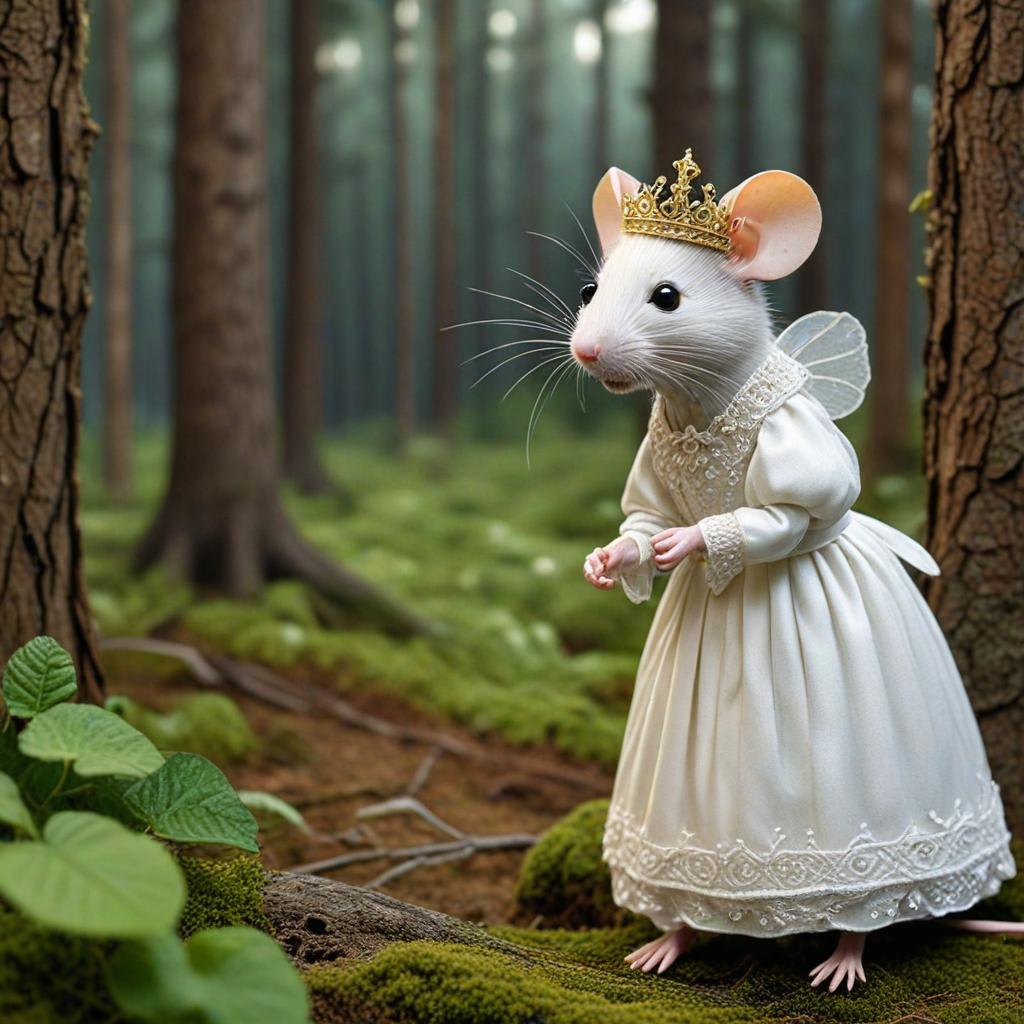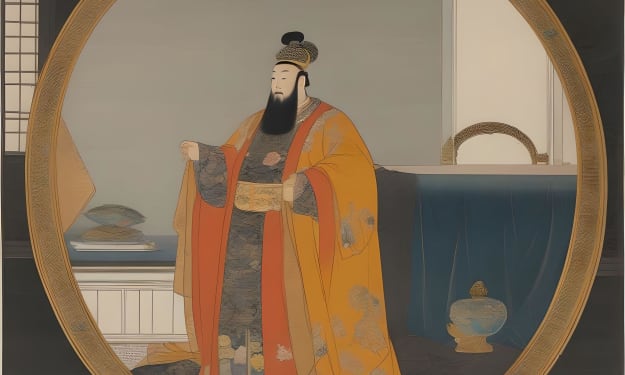"From Mouse to Princess: A Journey of True Love"
A Story of Faith and Magic from the Land of Finland

This tale is a traditional fairy tale/folk tale from Finland. Titled the forest bride this version of the story comes from the book mighty mikko a book of finnish fairy tales and folk tales by parker fillmore ,published in 1922.
Once upon a time, there lived a farmer who had three sons. One day, when the sons were grown, he said to them, "My sons, it's time for you to get married. Tomorrow I want you to go and find prospective wives."
"Where should we go, though?" inquired the oldest son. The father replied, "I've already given that some thought." "Each of you is to chop down a tree, and then follow the path the tree points. If you all take that step far enough, I'm sure you'll all find a worthy wife." Thus, the three sons cut down trees the following day. The oldest son's tree collapsed, pointing northward. "That works for me," he remarked, aware that there was a stunning girl on a farm up north. The second son's tree fell with its face facing south. "That works for me," the second son remarked, bringing to mind a girl he used to dance with who lived on a farm in the South.The tree of the youngest son, named Veikko, fell pointing straight into the forest. His older brothers laughed and said, "Veikko must go and propose to one of the she-wolves or one of the foxes." They meant that only animals lived in the forest and thought they were making a good joke about Veikko.
Veikko, though, declared that he was prepared to take a chance and follow the tree wherever it led. With great pleasure, the oldest brothers approached the two farmers whose daughters they admired and made a proposal. Veikko bravely started out as well, but after a while his bravery started to flag. "How can I find a wife in a place where there are no humans at all?" he asked himself.Just then he arrived at a small hut, and he pushed open the door and entered. The hut was empty, but there was a small mouse sitting on the table, gracefully combing its whiskers. But surely the mouse did not count.
Veikko yelled, "No one is here." The small mouse turned to face him and spoke in a dejected tone, "Why, Veikko, I'm here," as he stopped combing. "But you're just a mouse; you don't count." "I count, of course," the small mouse replied. Tell me, though, what you're hoping to find. "Well, my goal is to find a partner."The little mouse asked him further, and Veikko told the whole story about his brothers and the trees. The eldest brothers easily found their lovers, but I don't see how I can do the same in the forest, and it would be embarrassing for me to go home and admit that I'm the only one who failed.
The little mouse said, "Why don't you take me as your lover?"
Veikko laughed heartily. "But you're just a mouse. Who has ever heard of a man having a mouse as a lover?"
The mouse shook its head seriously. "Believe me, Veikko, you could do worse than having me as your lover. Even though I'm just a mouse, I can love you and be faithful to you."
She was a sweet and graceful little mouse, and as she sat looking up at Veikko with both paws under her chin and her bright eyes shining, Veikko grew fonder of her.
Then she sang a beautiful song to Veikko, and the song comforted him so that he forgot his disappointment of not finding a human lover. And when he left her to return home, he said, "Alright, little mouse, I will take you as my lover."
At that moment, the little mouse made a small sound of joy and told him that she would be faithful to him and wait for him no matter how long he took to return.
The eldest brother, when he returned, boasted of his lover saying, "Mine has the reddest cheeks you've ever seen."
"And mine," said the second son, "has long yellow hair."
Veikko said nothing.
"What's the matter, Veikko?" asked his brothers, laughing. "Does your lover have pointed ears or sharp white teeth?"
Veikko answered, "I have found a lover. She is a small, soft creature, wearing velvet."
"Wearing velvet?" the eldest brother repeated with a frown. "Like a princess," mocked the second brother.
"Yes," Veikko repeated, "wearing velvet like a princess. And when she sat and sang to me, I felt very happy."
"Ah," said the elder brothers unhappily that Veikko had such a great lover.
"Well," said the old farmer after a few days, "now I want to know what your lovers can do. Let each of them make me a piece of bread so that I can see if they are good housewives."
"Mine can certainly make bread, I'm sure of that," said the eldest son proudly. "And mine too," said the second brother.
Veikko remained silent.
"What about the princess?" they said, laughing. "Do you think the princess can make bread?"
"Well, I don't know," Veikko answered honestly. "I have to ask her."
Of course, he had no reason to believe that the little mouse could make bread, and by the time he reached the hut in the forest, he felt sad and disappointed.
When he opened the door, he found the little mouse sitting as before on the table gracefully combing its whiskers.
Seeing Veikko, the mouse danced with joy. "I'm so happy to see you," she chirped. "I knew you would come back."
Then when she saw that Veikko was silent, she asked what was wrong with him, and Veikko told her everything.
"My father wants our lovers to make him a piece of bread. If I go home without a piece of bread, my brothers will laugh at me."
"You don't have to go home without a piece of bread," said the little mouse. "I can make bread."
Veikko was very surprised to hear this. "I have never heard of a mouse being able to make bread."
"Well, I can," the little mouse affirmed.
With that, she began to ring a small silver bell. Soon the hurried footsteps were heard, small and rough footsteps, and hundreds of mice ran into the hut.
The little mouse princess, sitting very upright and dignified, said to them, "Each of you go and bring me the best grain."
They all ran fast and soon returned one by one, each bringing the best grain. After that, it was not difficult for the mouse princess to make a beautiful loaf of grain bread.
The next day, the three brothers presented to their father pieces of bread made by their lovers. The eldest son had a piece of wheat bread. "Hmm, very good," said the farmer. "For hardworking people like us, wheat bread is very good." The second son's piece was made of barley. "Barley bread is also good," said the farmer. But when Veikko presented a beautiful piece of white wheat bread, his father exclaimed, "What? White bread? Oh, Veikko, your lover must be wealthy."
Of course, the older brothers mocked. "Didn't he say she was a princess?"
"He said, when a princess wants fine white flour, how does she get it?" Veikko answered simply, "Well, she rings a small silver bell and when her servants come, she tells them to bring her the best grain."
Hearing this, the elder brothers were almost bursting with envy until their father had to reprimand them. "Enough," he said, "don't envy Veikko's luck. Each girl has made bread that she knows how to make and each in her own way may make a good wife. But before you take them home, I want one more test of their housekeeping skills. Let them send me samples of their weaving."
The elder brothers were very pleased to hear this because they knew their lovers were skilled weavers. "We'll see how our ladies do this time," they said, confident that Veikko's lover, whoever she was, would not embarrass them with her weaving. Veikko also doubted very much the mouse's ability on a loom. "Who has ever heard of a mouse being able to weave?" he said to himself as he pushed open the door of the small hut.
"Oh, you're finally here," the little mouse chirped happily. She reached out her small claws to greet him and then in her joy she began to dance around the table. "Are you really glad to see me, little mouse?" Veikko asked.
"Of course I'm glad," the mouse declared. "Aren't I your lover? I've been waiting for you and hoping you would come back. Does your father want something else this time, Veikko?"
"Yes, and it's something I'm afraid you can't give me, little mouse."
"Maybe I can. Tell me what it is."
"Well, it's your sample of weaving. I don't believe you can weave. I've never heard of a mouse being able to weave."
"Of course I can weave," said the mouse. "It would be strange if Veikko's lover couldn't weave." She rang the small silver bell again and instantly the sound of little mouse footsteps came from all directions, and they sat on their tails, waiting for the princess's order.
"Each of you," she said, "go and get me the best flax fiber."
The mice ran quickly and soon they began to return one by one, each bringing a strand of the best flax. When they had spun the flax and brushed it, the little mouse wove a beautiful linen cloth. It was so fine that she could fold it and put it into a walnut shell.
Veikko encounters several mice running swiftly, each returning one by one with flax fibers. The little mouse, skilled in weaving, creates a beautiful piece of linen so fine that she can fold it into a walnut shell. She presents this to Veikko, saying, "Here, Veikko, in this small box is my weaving sample. I hope your father will like it."
When Veikko returns home, he feels almost ashamed, believing his sweetheart's weaving will embarrass his brothers. Initially, he hides the walnut shell in his pocket. His eldest brother's sweetheart sends a sample of coarse cotton, which the farmer finds acceptable. The second brother's sweetheart sends a blend of cotton and linen, slightly better. The farmer then turns to Veikko and asks about his sweetheart's gift.
Veikko hands over the walnut shell to his father, which surprises and amuses his brothers greatly. However, their laughter stops when the farmer opens the walnut shell and extracts a large net made of the finest linen. "My son Veikko," he exclaims, "how did your sweetheart obtain such fine thread for weaving?"
Veikko explains simply, "She rings a small silver bell and orders her servants to bring the best flax fibers. They do so, and after spinning and brushing the fibers, my sweetheart weaves the net you see."
The farmer is amazed, commenting that while other girls may make good wives for farmers, Veikko's sweetheart might be a princess.
He suggests it's time for everyone to bring their sweethearts home to meet him. Veikko thinks about how his brothers will laugh when they discover his sweetheart is just a mouse. Yet he doesn't care; she has been a good companion to him.
When Veikko informs the little mouse that his father wants to see her, she is excited and insists on arriving in style. She rings her silver bell and orders a carriage and five black mice. The carriage arrives—a walnut shell—and the five black mice pull it.
Veikko walks beside the carriage, reassuring the little mouse not to be afraid, as his father is kind. As they leave the forest, they reach a small bridge over a river. As Veikko and the walnut shell carriage reach the middle of the bridge, they encounter a man who reacts with surprise and laughter at the sight of the unusual carriage. Startled, he accidentally pushes the carriage, causing it and its occupants to fall into the water below.
Veikko is distraught, shouting that the man has drowned his beloved. The man, thinking Veikko mad, hurries away. Tearfully, Veikko looks into the water, grieving for the little mouse. He declares his love for her, unaware of what might happen next.
To his astonishment, an elegant golden carriage emerges from the river, drawn by five gleaming horses. A coachman with golden lace reins and a footman in a feathered hat sit in the carriage. The most beautiful girl in the world sits inside. Her skin is as red as berries and as white as snow. Her long golden hair sparkles with gems, and she wears velvet layered with pearls. She nods to Veikko and invites him to sit beside her.
Veikko is speechless and asks if she is the little mouse. She confirms she was cursed and reveals that only Veikko's love could break it. Now freed forever, she suggests they go to Veikko's father, receive his blessing, marry, and return to her kingdom.
They continue to Veikko's residence. Veikko's father, brothers, and sweethearts bow in astonishment at the princess's carriage's arrival at their gate, intrigued by the presence of royalty. "Father, don't you recognize me?" yells Veikko. His dad raises his head and happily acknowledges him. Veikko presents the princess as his intended bride. Astonished, the farmer inquires as to where Veikko discovered a princess. Veikko clarifies that his tree's point was in the forest.
Shaking their heads, his brothers lament their own misfortune, adding that they could have discovered princesses too if only their trees had indicated the way to the forest. But they come to understand that Veikko's simplicity and kindness—even toward a small mouse—were what ultimately allowed him to find a princess, not the tree's pointing.
Veikko and the princess return to her kingdom, get married, and lead happy, ever after with their father's approval. Their tale honors the victory of genuine love, loyalty, and kindness over outward appearances and social expectations.
About the Creator
Enjoyed the story? Support the Creator.
Subscribe for free to receive all their stories in your feed. You could also pledge your support or give them a one-off tip, letting them know you appreciate their work.





Comments
There are no comments for this story
Be the first to respond and start the conversation.